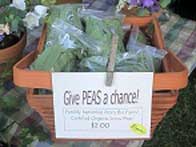 |
 |
 |
 |
 |
 |
 |
 |
 |
 |
|
Small Farm MarketingFor today’s small acreage farm to succeed in a very competitive market, the farmer must assess the opportunities the land has to offer, plan the crop, grow it, and then be able to sell it. Diversity is a natural thing to consider when planning an organic garden, and diversity is equally important in planning for sales of your crop, no matter what that crop is. To be a truly sustainable small acreage farm, this means that you have to make money at what you grow. And to do this, you have to be able to sell what you grow and receive a premium for it whenever possible.
I can’t tell you how many growers I have talked to over the past ten years that have had poor planning with the sales of their crop and ended up tilling it under over the frustration of not being able to sell it. One year a fellow called with an acre of green beans ready for harvest, wanting to know if I knew anyone that wanted some. By the time he found a market for his beans, they were too big and getting tough.
Marketing TipsGreentree Naturals began sales at the local Farmers Market, then we added a few restaurants and caterers, and after a couple of the restaurants went out of business, we started a small CSA (subscription produce service), and added sales to a local natural foods store, and a flower subscription service. As the gardens have expanded, so have our marketing techniques. By diversifying, we feel there is a little bit of a safety net to help us sell our goods. I would encourage everyone pursuing a small acreage farming enterprise to start small. See what you can manage and what sells best for you. Farmers Markets are a good place to start with sales. There are several excellent books out about selling techniques at Farmers Markets, check them out from the Library, borrow or buy one, but read them! The New Farmers Market and Sell what you Sow by Eric Gibson are two worthwhile publications. Display the name of your farm wherever possible! If you don’t have a farm name, get one! If you don’t have business cards, get some! You want your customers to know who they are buying from. With business cards available, you can give them out with every purchase and encourage return customers. 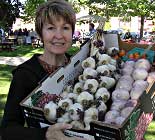
Loyal long time customer
1. Sell the best, compost the rest!
‘Hen with Attitude’ "My grandmother told me to never put all your eggs in one basket. This holds true for all aspects of marketing. For the small acreage farmer to succeed, we need to be diversified!”
|
2003 Rapid Lightning Road, Sandpoint, Idaho 83864 • 208-263-8957 • info@greentreenaturals.com
Site Design by Logical Expressions, Inc.
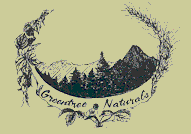

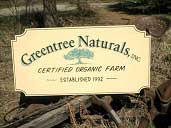
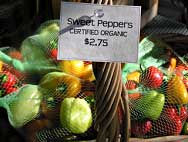 Who are you selling to? Who is going to buy your produce, herbs, eggs or whatever it is you are planning on producing? It is a very good idea to know who your customer is before you plant! As a small acreage farmer, our survival is keyed to selling what we grow. I would suppose that this is the case no matter what the size of your production area is. When we plant our two and a half acre garden, we know where eighty percent of our crop is going. This offers us some sense of security, if there is such a thing in the world of the small farm enterprise.
Who are you selling to? Who is going to buy your produce, herbs, eggs or whatever it is you are planning on producing? It is a very good idea to know who your customer is before you plant! As a small acreage farmer, our survival is keyed to selling what we grow. I would suppose that this is the case no matter what the size of your production area is. When we plant our two and a half acre garden, we know where eighty percent of our crop is going. This offers us some sense of security, if there is such a thing in the world of the small farm enterprise. Another producer planted a half acre of lettuce, not considering succession planting to keep a continuous crop, and had several hundred heads of lettuce ready to harvest at once. Most small acreage farmers depend on family labor; have little place to store abundance, or the ability to deal with this kind of bounty all at once.
Another producer planted a half acre of lettuce, not considering succession planting to keep a continuous crop, and had several hundred heads of lettuce ready to harvest at once. Most small acreage farmers depend on family labor; have little place to store abundance, or the ability to deal with this kind of bounty all at once.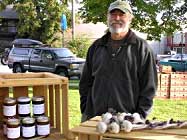 With these stories in mind, it is very wise to think about how much time and energy is going to go into harvesting your crop as well as post harvest handling. And, as always, how are you going to sell what you have grown? Marketing is one of the important keys to a successful farm, and often the toughest part of our survival. We don’t use mono-cropping in our gardens, why should we use mono-marketing techniques? Marketing takes time away from the farm duties, but is certainly a necessity to sell what you grow!
With these stories in mind, it is very wise to think about how much time and energy is going to go into harvesting your crop as well as post harvest handling. And, as always, how are you going to sell what you have grown? Marketing is one of the important keys to a successful farm, and often the toughest part of our survival. We don’t use mono-cropping in our gardens, why should we use mono-marketing techniques? Marketing takes time away from the farm duties, but is certainly a necessity to sell what you grow!